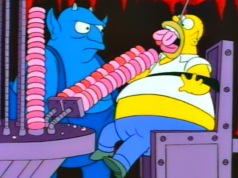President Bush is deeply concerned about the nation’s economy. You can tell because during his State of the Union address in January, he spent 45 minutes talking about why we should bomb Iraq — because Saddam Hussein is evil, duh — and 11 seconds talking about stimulating the U.S. economy, which he proposed we do by making Monopoly money legal tender.
As a citizen of this nation and a commentator for a daily newspaper whose voice is crucial in shaping government policy, I, too, am interested in our nation’s economic survival. In particular, I am worried about the doughnut situation.
When I was a kid, a package of six Hostess Frosted Donettes cost 50 cents. A candy bar cost the same. Now, a candy bar is around 65 cents, while the price of the doughnuts has skyrocketed to $1.10. These are the same doughnuts as when I was young — in some of your 7-Elevens, I believe they are LITERALLY the same doughnuts — with no improvements or changes made, yet their cost has doubled while the price of the candy bar has remained more or less stable.
What happened to cripple the doughnut economy? Did I miss a major crisis in the doughnut industry wherein doughnuts became scarce while demand increased? Was there a doughnut embargo at some point? Did a doughnut-producing nation enter a lengthy, expensive war that diminished its doughnut resources?
ECONOMICS STUDY QUESTIONS: Was Hostess’ decision to make up the word “donette” a financial one? Do you think “Donette” would be a pretty name for a girl?
So the donettes baffle me. But I have also thought deeply in recent weeks about other economic matters, such as teriyaki chicken.
Last weekend, my good friends Tanny and Donette (names have been changed) got married after years of him insisting they were “just friends” and her insisting they were in love with each other. Finally, she won, and a victory wedding occurred, followed by an exclusive luncheon that cost, I’m guessing, $400,000,000. (I personally ate at least $1,000 worth of food and stuffed my jacket with another $500 in dinner rolls.)
ECONOMICS STUDY QUESTION: Why do dinner rolls taste so dang good?
While numerous friends were in town for the festivities, Tanny and Donette showed us a video they had obtained when they got their marriage license in Provo. This video, produced by the state of Utah, gives tips to newlyweds on making their marriage work. One segment is about having children, and the expert being interviewed makes this observation about what will happen to your life:
“It’s going to be a lot more Happy Meals and food courts and less gourmet dinners and teriyaki chicken.”
Her point, I believe, is that children cost money to support, which you’ll agree is one of their major downsides. However, those of us watching the video were unsure why she believed teriyaki chicken was a prohibitively expensive dish. I have eaten plenty of teriyaki chicken at many Chinese buffets, some of which have names like Special Lucky Gourmet Deluxe Buffet, which means you can be sure it costs no more than $7 to eat there. Where is the video lady going that she is being so drastically over-charged for teriyaki chicken? Does she drive past Teriyaki Stix, a fast-food chain owned by the people who brought you Hogi Yogi, see all the people inside and think, “Hoo-boy, I wish I were wealthy enough to go there…!”?
ECONOMICS STUDY QUESTION: Who says “hoo-boy”? I mean, seriously.
No doubt about it, these are hard economic times. We’re going to have to band together, conserve our resources and spend wisely. And in the meantime, we need to bomb Iraq, what with all the evil going on over there.
[ I had the bit about the doughnuts written several months earlier, maybe even a year. It sat in my leftovers file until I could find an opportunity to use it — in a column, fittingly, about my two favorite things, food and money.
Donette the newlywed had a different pseudonym — one I’d been looking forward to using for her for quite some time because it was part of a great inside joke — until I realized “Donette” would be a better name in the context of this column. It was one of those very, very difficult choices we humorists have to make on a daily basis. ]




